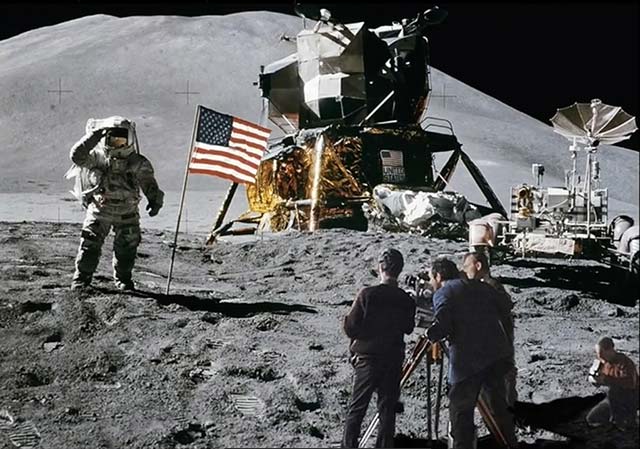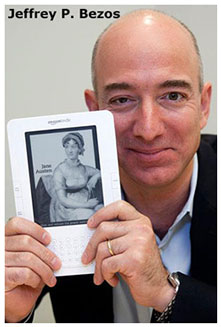Science Proves NASA Faked the Moon Landings - Moon Landing is a Hoax
NASA ADMITS WE NEVER WENT TO THE MOON

Did U.S. faked Moon landing? Well, absolutely, United States lacked both the ability and technology required to put a man on the Moon in 1960s. Even today in the year 2020 U.S. and NASA do not have the propulsion system and protective technology to go anywhere out side of Earth's gravity pull.
Also see: The U.S. Mythical Trip To The Moon
Sandy Hook and the Boston Bombing: You have Been Hoodwinked
- By Tyranny News Network - August 6, 2013
Video Analysis and Commentary
The burning question on some minds is, does the government run psy-ops against its own people? False-flag attacks and the like. The answer is yes, as both the evidence going back decades and the government’s irrefutable admissions proves.
Just because talking heads on TV tell you it’s crazy to believe such things doesn’t make it any less true. Why do you think they’re on the TV telling you this in the first place? Their job is and always has been to sell you the government and the construct of our society, among other things.
So, with that in mind I give you, “Sandy Hook & the Boston Bombing: You’re Being Hoodwinked.”
Jeffrey Bezos one of the World Economic’s Tyrannical future leaders students, proud killer of millions of small businesses in America, is admired for disrupting and destroying millions of small businesses, the backbone of U.S. economy.!
Jeffrey P. Bezos - A Mogul Gets a Landmark in the Capital
- By NICK WINGFIELD and DAVID STREITFELD - August 5, 2013 - The New York Times
SEATTLE — The Washington of Jeffrey P. Bezos has been the one of disruptive technology, fleece jackets and software engineers. He has shown little interest in the Washington of politics, power suits and Woodward and Bernstein.
Yet now, from his tech frontier in Seattle, Mr. Bezos has bridged those far-flung worlds by buying The Washington Post.
 The purchase price of $250 million is a pittance for a man who ranked 19th on Forbes magazine’s list of billionaires, with an estimated fortune of more than $25 billion. But the deal was still an astonishing move for a magnate who has kept a low profile in politics and has said almost nothing about his interest in newspapers, except that he reads them.
The purchase price of $250 million is a pittance for a man who ranked 19th on Forbes magazine’s list of billionaires, with an estimated fortune of more than $25 billion. But the deal was still an astonishing move for a magnate who has kept a low profile in politics and has said almost nothing about his interest in newspapers, except that he reads them.
Nonetheless, Mr. Bezos will now have a microphone as powerful as anyone in Washington and outside the West Wing. Keeping with a lot of his tech industry peers, he brings with him a sort of libertarian bent, having supported gay marriage in the state of Washington and fought higher income taxes on wealthy people.
“Of the businesspeople I know, he and Bill Gates are the two most intellectually curious people I know,” said Rob Glaser, the founder of another Seattle technology company, RealNetworks, who has known Mr. Bezos since the 1990s. “It doesn’t surprise me that Jeff would find something with the intellectual depth of The Post an intriguing, compelling thing to be involved with.”
Mr. Bezos, 49, said in a statement on Monday that he would leave the day-to-day operations at The Washington Post to others. But his history — rising quickly as a Wall Street whiz, then starting Amazon.com out of a garage and building it into a retailing giant — is chock-full of cold calculations to improve his company’s fortunes. Many of his decisions have panned out, as Amazon has muscled its way into nearly every corner of retailing, leaving many competitors chafed its his wake.
The purchase of The Washington Post fits into one of the more eclectic — some might say, eccentric — patterns of investing and charitable giving of today’s billionaires. On top of the usual ream of stakes in technology start-ups like Uber and Twitter, Mr. Bezos has indulged his passion for space by financing the recovery from the seabed of an Apollo rocket that carried the first men to the moon.
He is paying for creation of a clock buried in a mountain in West Texas that will tick once a year for the next 10,000 years.
And now, Mr. Bezos — a man known for being an unsentimental businessman — has invested squarely in a sentimental business steeped in tradition. Of course, The Washington Post deal could feed his demonstrated appetite for reinventing venerable industries, from retailing to book publishing. Amazon’s Kindle business has turned Mr. Bezos from a merchant into a media mogul, as celebrated in some circles as another digital disrupter, Steven P. Jobs, Apple’s former chief executive.
Mr. Bezos and Donald E. Graham, The Washington Post’s chief executive, have longstanding connections that may have helped the discussions. As an article on The Post’s Web site noted on Monday, Mr. Graham gave the Amazon chief advice on how to promote newspapers on the Kindle device. And Amazon is an investor in LivingSocial, an e-commerce venture led by Tim O’Shaughnessy, Mr. Graham’s son-in-law.
He has provided few clues about what changes might be in store. In an interview last year, though, he stated that he did not think people reading the Web would pay for a newspaper subscription because they were too trained to get it free. The Washington Post started an online subscription plan this year.
He said in the same interview that there would be no printed newspapers in 20 years. The Washington Post had more than 457,000 subscribers to its daily edition in the first quarter of this year.
This year, Mr. Bezos was one of a group that put $5 million into the Business Insider, a news site founded by Henry Blodget. Mr. Blodget rose to fame as a Wall Street analyst in the late 1990s with a wild forecast for Amazon’s shares that came true.
Drew Herdener, a spokesman for Amazon, who works with the Amazon chief on his personal initiatives, said Mr. Bezos was not available for an interview.
As Amazon has grown, so too has the volume of criticism of the company. It controls at least a quarter of the book business, more than any company in the past. Critics say that concentration is unhealthy.
Mr. Bezos’ disinclination to collect sales tax led him to investigate setting up Amazon on an Indian reservation. The company stoutly resisted efforts in many states over the years to get it to collect the taxes, saying it preferred a national solution. A tax reform measure mandating the collection of taxes by Internet companies has passed the Senate but is stalled in the House.
Critics of Amazon were aghast at the news of The Washington Post purchase, saying it would further increase the power of a company and a tycoon they think already has too much of it. Although Mr. Bezos and not Amazon bought The Post, rivals and critics were already concerned that the newspaper’s work would be used to help Amazon.
“It’s an old boring story — rich man buys a newspaper — but in this instance it’s one of the richest men ever buying one of the most important newspapers ever, which is the one our government leaders read first thing every morning,” said Dennis Johnson, the co-founder of Melville House, a well-regarded small publisher. “This is the capper in the development of one of the most powerful vertical monopolies in our history, which is also one of the most controlling in matters of cultural concern.”
Mr. Bezos was a tinkerer from an early age. After Princeton, he went to Wall Street, ending up at D. E. Shaw & Company, a hedge fund. He began Amazon when he took note of two things: how fast the Internet was growing as it became a consumer medium in the early 1990s, and how well-suited the book business was to selling online. One Web site could offer all the hundreds of thousands of titles in print in a way that a land-based store never could.
But as Amazon grew big, Mr. Bezos himself largely shunned the media spotlight. Mr. Bezos has also mostly shunned the political spotlight, as well. His political contributions have gone mostly to Amazon’s corporate PAC, which divides its campaign checks relatively evenly between Democratic and Republican candidates. The stepson of a Cuban immigrant, Mr. Bezos has stayed out of the immigration debate that has attracted so many luminaries from the technology business.
Last year, Mr. Bezos and his wife made waves with a $2.5 million contribution to the successful campaign to legalize same-sex marriage in Washington State. He was one of the biggest donors in 2010 to another winning effort to defeat a proposed income tax on the wealthy in Washington State. People who know Mr. Bezos describe his political views as libertarian, with a small “l.”
On Monday, Mr. Bezos told Washington Post employees that he did not intend to leave his full-time Amazon duties, or to relocate.
“I am happily living in ‘the other Washington’ where I have a day job that I love,” he wrote.
Nick Wingfield reported from Seattle and David Streitfeld from San Francisco. Nicholas Confessore contributed reporting from New York.
Dr. David Martin – Quantum Disentanglement
Dr. David Martin at the Breakthrough Energy Movement conference, 2012 Holland
Title: Quantum Disentanglement, emancipating the economics from Edison and Einstein to everyone
Of Thomas Edison it has been said, “He led no armies into battle, he conquered no countries, and enslaved no peoples… yet exerted a degree of power the magnitude of which no warrior ever dreamed.” This nostalgic propaganda masks 135 years of carnage, genocide, and economic enslavement so endemic that its core assumptions are seldom challenged. Pillaging combustible carbon from the earth, rerouting the coursing rivers, killing populations for the copper on which they live, and enslaving every pensioner to fund the ubiquitous addiction to a 60Hz hypnosis, no energy breakthrough can manifest until we unwind the copper choking our conscience and generators lubricated with anonymous blood. In his presentation, futurist and global capital market’s expert Dr. David Martin will unveil the anatomy of the incumbent systems of economic controls and present a practical transition plan to an ethical framework for Phase and State Coherent Economical Power at Human Scale.
BIO
Dr. Martin is the Executive Chairman of M-CAM, Inc., the international leader in ethical innovation utilization, innovation finance and trade, and intellectual property-based financial risk management. He is the author of the international legal framework for the Heritable Knowledge Trust and Heritable Innovation Trust programs. M-CAM is the global steward of the world’s only Global Innovation Commons providing open source innovation in the domains of water, non-carbon energy, agriculture, and health technologies. His work on ethical engagement and stewardship of community and commons-based value interests is at the forefront of global financial innovation. He was the founder of the world’s first regulated intangible asset finance system deployed throughout the majority of Bank of International Settlements member institutions and was instrumental in transforming transparency and accountability systems therein. Dr. Martin’s work as a Fellow of the Batten Institute at the Darden Graduate School of Business Administration at the University of Virginia. He has closely advised innovation-based finance and investment programs in India, China, Denmark, the European Union, the United Kingdom, South Africa, the Islamic Republic of Iran, the United States, and the United Arab Emirates. He has served as the Constitutional and Economic advisor to the Autonomy Committee of East New Britain, Papua New Guinea and has worked with ethical trade frameworks for the Kingdom of Tonga, the Independent State of Samoa, Fiji, and Papua New Guinea.


